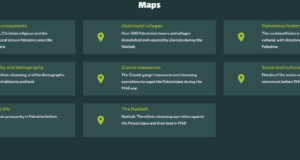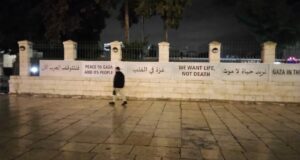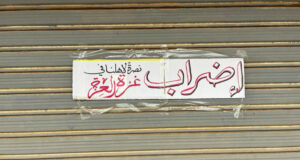You go through a strange range of emotions while incarcerated. Being shackled at the ankles forces you to shuffle painfully, ungainly, slowly. It reduces you to an infirm.
Our arrest was a strange experience..
It was an immense joy to see over two hundred Palestinians cheer at their removal of the massive concrete blocks which have obstructed their road, their lives, for years.
Their cheers before and during the removal were nothing compared to those which followed the heaving aside of the last intrusive Occupation block. The efforts of the Palestinians, with the help of some Israelis and internationals, bore fruit after about 40 minutes of coordinated heaving and pulling. It is the act of physically repelling the barriers, rather than simply using a tractor to push them aside, that makes the accomplishment so much sweeter.
So when, on our way to lunch after hours of activity in intense heat, we saw the military bulldozer readying to replace the immense blocks so laboriously pushed aside it was an instinctive and reflexive response to run to the site to try to prevent the roadblock replacement.
Being only 5 activists, with as many blocks to cover, we opted to try to individually prevent each block from being moved. Retrospection ever crystal clear, a more unified resistance would have been more effective.
The arrest came following the words: “this road is now a closed military zone,” referring to the Palestinian road upon which we sat. Papers in Hebrew were produced, but unable to verify their validity, and very aware of their spontaneous birth, we sat on. The papers were a sham, the kind the army drafts up on the spot and waves merrily when it wants to contravene established laws and boundaries. Yet, it is miraculous manifestations of military orders like these which do, in the end, serve the purpose: to bend the law and achieve a specific goal. In this case, the goal was the removal of the activists and the replacement of the roadblocks.
One by one we were carried or dragged away from the roadblocks’ site, relocated roadside between military jeeps, while the bulldozer did its work. Cement blocks were re-installed, and a new layer of blockage dug out from the earth walls surrounding the road, piled on top of the cement to create a two-tiered blockage.
One of the two males detained had his hands cuffed tightly behind his back, the soldier having first pulled his arms back and upwards at painful angles.
Legally, soldiers are allowed to detain internationals only for up to three hours, after which they must be released. Before the three hours’ detention had elapsed, long after the re-installation of the roadblocks, police arrived and began questioning us. We were taken to the Ariel settlement police station for further detention.
From the moment of being arrested until my release, the other female international and I were kept in handcuffs and/or ankle shackles, only temporarily removed for most, but not all, bathroom visits—on one occasion, we were indeed forced to use the toilet while shackled together at the ankles. Friday evening, the first evening of my arrest, was spent in handcuffs in a waiting room in the men’s prison. Saturday before, during, and following the trial I was shackled at the ankles. I was made to sleep thus Saturday evening.
Friday night, the other female arrested and myself were not provided with a jail cell, nor with beds or blankets. With the television on all night at a very loud volume, showing a movie that bordered on pornography and which the police would not turn off, and with the lights on for most of the night, no place to lie down, and the chill from the air conditioning, it was impossible to sleep. Despite repeated requests, the police officers made no attempt to improve the conditions, instead mocking and taunting us.
While the tendons at my ankles hurt, chaffed by hard-edged shackles, and I could only shuffle past accusing eyes, I refused to feel “guilty” or be relegated to sub-human, as their stares would imply. I was there only because of their flawed, racist system of oppression which ignores even its own High Court ruling.
The arrested males were given dingy cells and sparse food.
The conditions presented to us by the Israeli judge at Saturday’s trial were unacceptable: the judge chose to ban us from the West Bank cities of Ramallah, Nablus, and Bethlehem simply because those were cities in which we had mentioned we had friends. As we did not produce passport ID, we were taken back to jail for a second night. This night, despite the judge’s order to at least provide me with a cell, I was made to sleep in a room with a female police officer, still shackled at the ankles.
The next morning, I was awoken and made to sit for several hours, still shackled, before being taken for the 2nd trial. At this trial, our state-appointed lawyer did not communicate with us and it was only through the aid of an Israeli friend that we were told the conditions of our release, which remained the same as the previous day. Feeling our options were limited, our passports present, we signed and were released.
Having the passport of white skin and a young woman’s face, I was nonetheless treated with more sympathy and privilege than Palestinian counterparts are given.
Lest I dehumanize my jailers just as their system does the general population of Palestinians, I must recognize that they are cogs in a machine, humans filling a role they perceive to need, that of security enforcers, against a population they perceive as threatening.
It is over and again the System that is greatly racist and flawed, cunningly devised and enforced.
Overall, aside from three very sarcastic and provoking male police officers, the police were generally humane, though still blindly fulfilling their role in the Apartheid regime and not fulfilling their obligations to provide arrestees with a cell, to remain arrested but unshackled.
While some of the female police officers, young women, acted with more consideration, most of the male officers showed disdain and disrespect to all of us arrested.
In allowing ourselves to be arrested, we hoped to highlight the very serious issue of roadblocks and checkpoints in Occupied Palestine, as well as to send a message to the residents of Sarra and surrounding villages that we see their suffering and are committed to joining in their struggle. It is an honour to work with dedicated Israelis like the Israeli Anarchists who, for many years, have endeavored to fight the Occupation and its policies, also suffering arrest and abuse at the hands of the IOF.
 International Solidarity Movement Nonviolence. Justice. Freedom.
International Solidarity Movement Nonviolence. Justice. Freedom.


